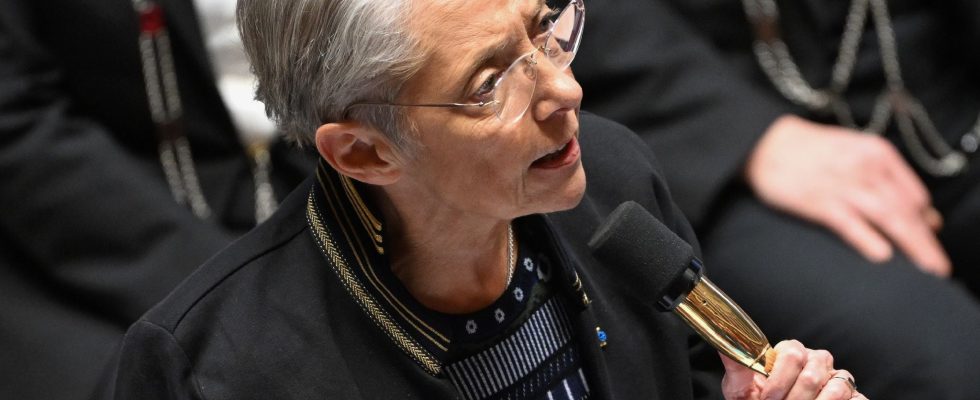Elisabeth Borne has not forgotten it. On the evening of her dismissal from Matignon by Emmanuel Macron, the Prime Minister received a bouquet of flowers sent by Gérald Darmanin. A long war of attrition ends. Everyone can forgive the other for their insults. She, the summer offensive of the tenant of Beauvau to steal his place. Him, the sabotage of his political return to Tourcoing. The rivalry is over, peace can be signed. The examination of the immigration bill had outlined this armistice. Charged by the Head of State to obtain an agreement at all costs with the right, Élisabeth Borne and Gérald Darmanin had worked in good harmony. And shared a dinner, before Christmas, in a seafood restaurant.
Since, they do not leave each other. The two friends had lunch together this Tuesday, February 6, after the Moroccan vacation of the former head of government. The situation has changed. Élisabeth Borne once again became a deputy for Calvados. Became, rather. Elected during the legislative elections of June 2022, she has never sat in the National Assembly, since she was appointed to Matignon before her election. The Renaissance representative will make her return this Tuesday to the Palais Bourbon, during a question session with the government (QAG).
Lunch with Braun-Pivet and Darmanin
Élisabeth Borne carefully prepares this new life. She had lunch on February 5 with the President of the National Assembly Yaël Braun-Pivet, three days after having coffee with her predecessor Richard Ferrand. She broke bread with her successor Gabriel Attal, exchanged with ministers – like Roland Lescure – and deputies. Not hesitating to send photos of his Moroccan getaway. Her interlocutors describe a woman who is “motivated”, “not embittered” and keen to “learn”. Biting, too. A former member of the government, interviewed for a lunch, responded perfidiously to his invitation: “We will say bad things about everyone.” “We should get there,” she replied with humor.
The majority are preparing for this arrival. The boss of the Renaissance group Sylvain Maillard spoke with his new colleague at the end of January. Élisabeth Borne will sit on the Foreign Affairs Commission, while her deputy was in social affairs. She informed her president Jean-Louis Bourlanges of this choice by SMS, before speaking with him for a few minutes on the sidelines of the national tribute to the French victims of Hamas. “It is a very suitable commission for a former Prime Minister, judges the centrist. It is prestigious and very free from internal quarrels.”
Cajoling the former head of government without exposing her to blows: the presidential camp is trying to resolve this equation. Thus, Élisabeth Borne will occupy a central place in the hemicycle – seat 255, currently occupied by Ingrid Dordain Saint – and away from the opposition. “We do this with all the ministers,” says a Renaissance collaborator. “We are not going to sit them next to the LFIs.” As Politico revealed, the Borne case was on the menu of a lunch bringing together the management of the Renaissance group at the Assembly. Yvelines MP Nadia Hai proposed organizing a questure drink bringing together ministers returning to the Assembly, such as Olivier Dussopt or Élisabeth Borne, and their substitutes. Another question: should we give her special treatment on Tuesday during her first group meeting or welcome her like an ordinary MP?
“It’s not dishonorable for her”
Élisabeth Borne is not an average parliamentarian. A Renaissance MP almost choked when she learned that the polytechnician was going to join the hemicycle. “Are you serious?” she asked. It seems so. Traveling in her Calvados constituency on Thursday, she said she was “happy to find deputies with whom (she) has been working since 2017” and assured that she wanted to “complete her mandate”. A response to those who already send it to the Constitutional Council or in the private sector. “She has taken a liking to politics,” notes a ministerial advisor. “She wants to influence the 2027 line and is attentive to ensuring that the central bloc remains.”
A return, but for what purpose? The Assembly is hampered by the relative majority, while Prime Minister Gabriel Attal intends to reform more through regulations than legislation. A fear of emptiness grips parliamentarians when faced with the agenda for the coming months. The hemicycle is a cauldron threatened with running empty. “It is in these calmer moments that we can work on substantive issues,” defends Paris MP David Amiel. “This will interest him more than fighting amendment battles on PJLs.” “It is not dishonorable for her to return to Parliament,” adds a minister. “It is a great mandate. It is now up to her to define it and do with it what she wants.”
It is generally agreed that Élisabeth Borne does not intend to structure the left wing of the majority, an old antiphon in Macronie. “I don’t see her as a micro-chapel leader given the strong responsibilities she has held,” says a Renaissance executive. On Sunday January 7, she again proposed a tighter government to Emmanuel Macron: why not bring together Bercy and Labor? Merge energy and ecology? Education and higher education? Going in two months from architect of a government system to administrator of a Telegram loop is hardly exciting. And then, the elected official from Calvados did not cultivate a strong relationship with the parliamentarians during her time at Matignon. She does not benefit from a network of elected officials, like Gérald Darmanin or Bruno Le Maire. “She doesn’t know this group well in all its components,” notes an MP. Therein lies perhaps his first challenge: becoming acquainted with a diverse majority. Before forming a political partnership?
.
